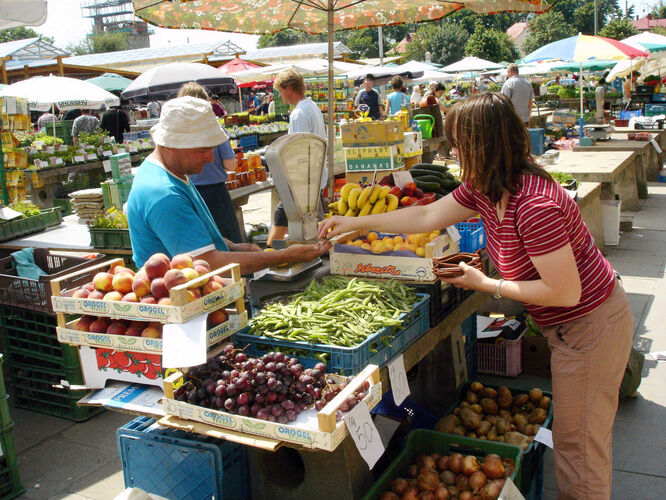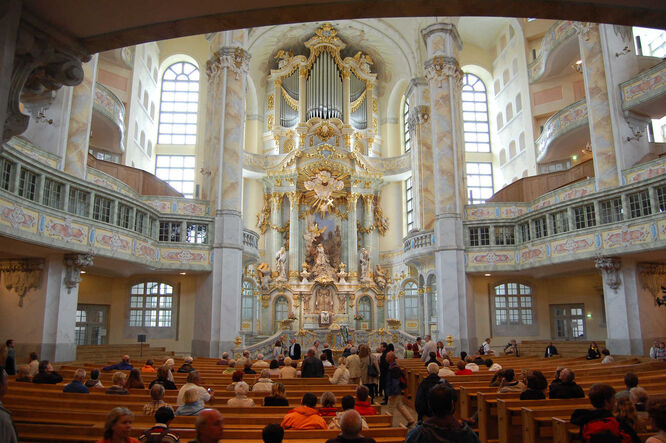Tips for Traveling as a Temporary Local
By Rick Steves
Many travelers tramp through foreign lands like they're visiting a cultural zoo. "Ooh, that guy in lederhosen yodeled! Excuse me, could you do that again in the sunshine so I can get a good picture?" (This outlook seems especially prevalent among tourists in Europe, perhaps because its cultural icons and clichés are so well known beyond its shores.)
Of course, an outsider-looking-in perspective keeps travelers apart from a more meaningful, and more interesting — and memorable — connection to the culture and contradictions that lie beneath the surface and beyond the stereotypes. For a richer experience, try not to think in terms of photo ops, be open to encounters that don't fit your preconceptions, and enjoy the real thing.
When I'm overseas, I strive to become a cultural chameleon — what I call a "temporary local." While I never drink tea at home, I enjoy a "cuppa" with breakfast in Britain — and a strong espresso over a tiny breakfast in Italy. You may not normally be much of a napper, but on a hot Spanish afternoon, why not return to your room for a restorative siesta? (All the better for joining in the late-night street scene!) In Stockholm, see what a daily fika — the Swedes' revered ritual break for chitchat over a hot drink and pastry — can do for your mood. Taking our cues from local norms, we can try out different ways of life while immersing ourselves in the culture we traveled so far to experience. The less we feel like outside observers, and the more we accept a different culture on its own terms, the better we can appreciate and enjoy its fascinating uniqueness.
Wherever you travel, find ways to really be there. Tune in to the rhythm of daily life, look for opportunities to connect with people…and be ready for the unexpected. Here are some ideas to consider for a European trip:
Hit the back streets. Many people energetically jockey themselves into the most crowded square of the most crowded city in the most crowded month (St. Mark's Square, Venice, July) — and then complain about the crowds. If you're in Venice in July, walk six blocks behind St. Mark's Basilica, step into a café, and be greeted by Venetians who act as though they've never seen a tourist.
Play where the locals play. A city's popular parks and green spaces are filled with families, lovers, and old-timers enjoying a cheap afternoon or evening out. European communities provide their heavily taxed citizens with wonderful athletic facilities. In Britain, check out a public swimming pool at the local "leisure centre." While tourists outnumber locals five to one at the world-famous Tivoli Gardens, Copenhagen's other amusement park, Bakken, is enjoyed purely by Danes. Disneyland Paris is great, but Paris' Parc Astérix is more French.
Take a stroll. Across southern Europe, communities relax with a paseo, or stroll, in the early evening. Stroll along. Join a Volksmarch in Bavaria to spend a day on the trails with people singing "I love to go a-wandering" in its original language. Mountain huts across Europe are filled mostly with local hikers. Most hiking centers have alpine clubs that welcome foreigners and offer organized hikes.

Go to church. Many regular churchgoers never even consider a European worship service overseas. But any church, mosque, or synagogue would welcome a traveling American. And an hour in a small-town church provides an unbeatable peek into the community, especially if you join them for coffee and cookies afterward. I'll never forget going to a small church on the south coast of Portugal one Easter. A tourist stood at the door videotaping the "colorful natives" (including me) shaking hands with the priest after Mass.
Be an early bird. Throughout Europe — on medieval ramparts, in churches, produce markets, alpine farmsteads, and Riviera villages — the local culture thrives while the tourists sleep. In Germany, walk around Rothenburg's fortified wall at breakfast time, before the tour buses pull in and turn the town into a medieval theme park. Crack-of-dawn joggers and walkers enjoy a special look at wonderfully medieval cities as they yawn and stretch and prepare for the daily onslaught of the 21st century. By waking up with the locals on the Italian Riviera in the off-season, you can catch the morning sun as it greets a sleepy village, breathe in the damp, cool air…and experience a rare Italian silence. Among travelers, the early bird gets the memories.
Root for your team. For many Europeans, the top religion is soccer. Getting caught up in a sporting event is going local. Whether enjoying soccer in small-town Italy or hurling in Ireland, you'll be surrounded by a stadium crammed with devout fans. Buy something with the hometown colors to wear or wave to help you remember whose side you're on. In Dublin, I once joined 60,000 locals to watch a hurling match at Croke Park. Taking my seat, I was among new Irish friends. They gave me a flag to wave and taught me whom to root for, the rules of the game…and lots of creative ways to swear.
Challenge a local to the national pastime. In Greece or Turkey, drop into a teahouse or taverna and challenge anyone to a game of backgammon. You're instantly a part (even a star) of the café or bar scene. Normally the gang will gather around, and what starts out as a simple game becomes a fun duel of international significance.
Contact an equivalent version of your club. If you're a member of an international service club, bridge club, professional association, or other organization, make a point to connect with your foreign mates.
Join in. When you visit the town market in the morning, you're just another hungry shopper, picking up your daily produce. Traveling through the wine country of France during harvest time, you can be a tourist taking photos — or you can pitch in and become a grape picker. Get more than a photo op. Get dirty. That night at the festival, it's just grape pickers dancing — and their circle could include you.
If you're hoping to glimpse cultural peacocks, remember they fan out their tails best for people, not cameras. Take part in the culture yourself — as much as you can — and it might just become a new part of you.

